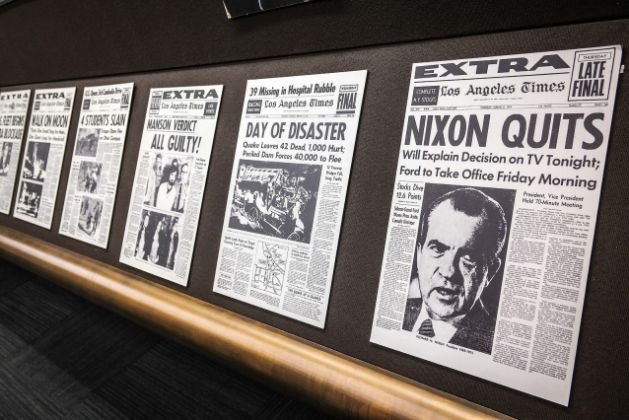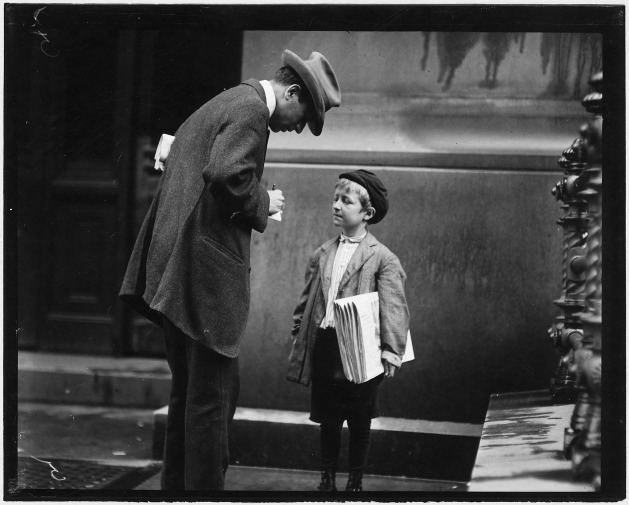A bill filed by U.S. Rep. Mark DeSaulnier, D-Calif., would make it easier for “written news organizations” to claim nonprofit status, “allowing them to focus on content instead of profit margins and reduce their tax burden.”
The bill, H.R. 3126, has been endorsed by the News Media Alliance, the National Newspaper Association, the American Society of News Editors, the Associated Press Media Editors, the Association of Alternative Newsmedia, the California News Publishers Association, Free Press Action and the Open Markets Institute.
Nonprofit news is nothing new — organizations ranging from public media to hyperlocal community websites have nonprofit status. Donors are able to write off contributions, and the news organizations themselves are exempt from most taxes.
But it’s not easy. Back in 2013, I wrote that the IRS had virtually stopped granting 501(c)(3) nonprofit status to startup news organizations as it wrestled with the question of whether journalism was among the educational activities envisioned under the tax code.
Though it’s my understanding that the agency has loosened up since then, questions remain. For instance, The Salt Lake Tribune recently announced that it would seek nonprofit status, which would make it the first regional newspaper to do so. Writing at the Nieman Lab, though, Christine Schmidt and Joshua Benton wondered whether the Tribune would run into trouble for its coverage of professional sports and the restaurant scene, which would appear to fall outside the IRS guidelines.
On the other hand, Paul Bass, the founder of the New Haven Independent, a 13-year-old nonprofit news project, told me recently that the only guidance he ever received was that the Independent could not endorse political candidates or lobby the government.
Presumably DeSaulnier’s bill will help clear up those issues. And a personal note: I played a very small role in crafting the legislation. DeSaulnier and I discussed his ideas last fall, and I suggested to his office — unsuccessfully — that the bill not be restricted to “written” forms of journalism.
The legislation is one of two stories in the news right now about the future of local journalism. The other is a proposal by the newspaper industry to suspend antitrust laws so that they may negotiate collectively with social media platforms in an attempt to obtain payment for the use of their content.
The News Media Alliance, the newspaper business’ principal lobbying group, released a study this week claiming that Google and Facebook made $4.7 billion in 2018 through its uncompensated use of material that originally was published on newspaper websites.
You can read the full text of Rep. DeSaulnier’s bill to encourage nonprofit journalism by clicking here. The text of his office’s press release is below.
June 6, 2019 | Press Release
Washington, DC – Today, Congressman Mark DeSaulnier (CA-11) announced the introduction of the Saving Local News Act (H.R. 3126), a bill to recognize newspapers as a public good and make it easier for written news organizations to become non-profits – allowing them to focus on content instead of profit margins and reduce their tax burden. The bill is supported by the News Media Alliance, the National Newspaper Association, the American Society of News Editors, the Associated Press Media Editors, the Association of Alternative Newsmedia, the California News Publishers Association, Free Press Action, and the Open Markets Institute.
“Local journalism has been a bedrock of American society for over 200 years. I remember when dedicated reporters sat in the front row of city council meetings to keep communities informed and to increase accountability. Today many local newspapers are dying out – penny pinching until they close or are bought up and sold off piecemeal by hedge funds. This bill would allow papers to renew their focus on quality content and flourish unencumbered by ever-increasing demands for greater profits,” said Congressman DeSaulnier.
“We commend Congressman DeSaulnier for introducing this important piece of legislation that recognizes the importance of nonprofit journalism to the American society. At a time when news deserts are a growing concern, we must ensure that we support all newsrooms in their efforts to provide high-quality journalism to their local communities. This journalism bill that would allow non-profit newsrooms to treat advertising revenue as nontaxable income could be helpful to a number of publishers,” said David Chavern, President and CEO, News Media Alliance.
“News organizations today must explore a wide array of avenues for sustainability, one of them being non-profit status. But the federal law lays many trip wires along this path, including the way advertising is taxed. The non-profit route could be attractive for some newspapers if and only if Congress recognizes that even a non-profit newspaper still needs good revenue sources. This proposal by Congressman DeSaulnier will open up new possibilities for sustaining quality journalism in American communities. We appreciate the concept and, even more, we welcome the interest from an important member of Congress in helping newspapers that are at risk to survive,” said Andrew Johnson, President, National Newspaper Association.
“This legislation carries the promise of helping news outlets large and small, in big cities and small towns, throughout the country. It will allow for innovation into new models of journalism and carries significant potential to address the growing problem of ‘news deserts’ around the country where the for-profit model is not sustainable,” said Angie Muhs, President, Associated Press Media Editors.
“The nonprofit model of journalism may well be one viable future of journalism, at least where smaller publications are involved. This is a constant topic of discussion among our membership which is why our organization welcomes this legislation as a means of increasing the likelihood that those who choose can convert themselves to non-profit status, while maintaining a strong journalistic enterprise,” said Molly Willmott, President, Association of Alternative Newsmedia.
“At a time when editors around the country continue to see newsrooms shrink in the face of financial constraints, we welcome every avenue to greater revenue. This legislation offers significant assistance that will allow news organizations to survive without constraining their actual journalism in any way,” said Nancy Barnes, President, American Society of News Editors.
“Community newspapers are woven into the fabric of American society and provide accurate and trusted information that improves the lives of individuals in the communities they serve. It is no secret that newspapers face an increasing number of existential threats from online competitors which have left them with a decreasing number of revenue opportunities. This measure would provide news organizations with the means to better rise to these challenges and continue to play a vital role in their communities by holding the feet of the powerful to the fire and giving voice to the powerless,” said Jim Ewert, General Counsel, California News Publishers Association.
Since 2017, estimated daily newspaper circulation fell 11 percent from the previous year (Pew Research Center). Congressman DeSaulnier recently established a working group of dedicated Members of Congress from areas affected by a drought of high-quality journalism. Together they have been working to highlight this crisis and bring attention to the need to promote local journalism, including by holding a Special Order on the floor of the U.S. House of Representatives and introducing the Journalism Competition and Preservation Act (H.R. 2054), a bill to create a temporary safe harbor from anti-trust laws to allow news organizations to join together to negotiate with dominant online platforms to get a fair share of advertising profits.
Talk about this post on Facebook.








